The Supreme Court on Friday expressed its dissatisfaction with Tamil Nadu government’s stand that the Vedanta’s oxygen plant cannot be reopened due to potential law and order problem.
A bench headed by Chief Justice S.A. Bobde said: “When people are dying, Tamil Nadu cannot say it cannot open because of law-and-order issue. It is not about Vedanta or any other company. State government can’t make such an argument.”
Advertisement
The bench also comprising Justices L. Nageswara Rao and S. Ravindra said if Vedanta cannot be allowed to run the plant, then the Tamil Nadu government should take over it for oxygen production amid the COVID-19 crisis.
Senior Advocate C.S. Vaidyanathan, representing Tamil Nadu government, submitted that reopening of the oxygen plant could lead to law and order problems since the locals have opposed the re-opening of the plant. “There was a shooting incident which killed 13 people, district administration will find it difficult to handle”, contended Vaidyanathan.
Solicitor General Tushar Mehta, representing the Centre, submitted, “the country is in dire need of oxygen. Different states need it..law and order cannot be an excuse.” Mehta supported the re-opening of Vedanta plant to meet the medical oxygen shortage. The top court asked the Tamil Nadu government to file an affidavit in the matter by Monday.
During the hearing, the top court suggested the Tamil Nadu government to take over and produce medical oxygen. The top court said “Why don’t you fulfil your responsibility in manufacturing oxygen? Just because you have problem with Vedanta you will not manufacture oxygen. What kind of argument is this?”
The bench emphasized it is not concerned who runs the plant, instead the court is interested in ensuring oxygen is produced at the plant.
A counsel in the matter said Tamil Nadu is not manufacturing oxygen because it is an oxygen surplus state, which was recorded in an order passed by Madras High Court on Thursday.
However, the bench responded that other states’ need of oxygen and resources of the country should be distributed equally, which is a directive principle of state policy under the Constitution.









